One Year Later, Crimeans Prefer Russia
According to a survey that a Bloomberg contributor called "the most representative independent poll taken on the peninsula since its annexation," 82 percent of Crimeans fully support their region's inclusion in Russia rather than Ukraine, while only 4 percent spoke out against it.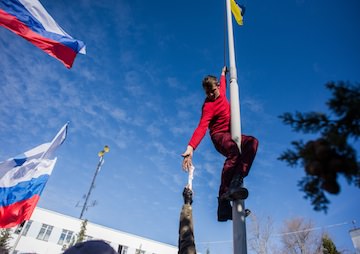
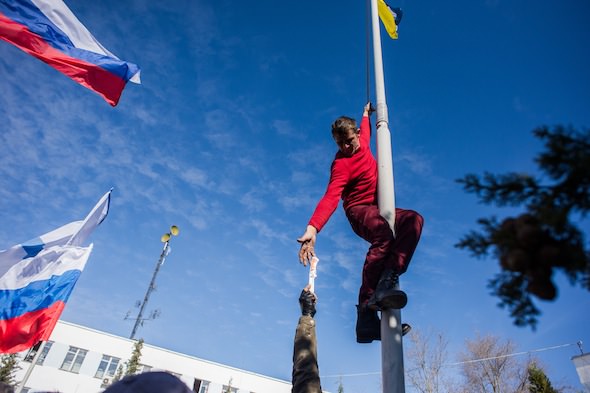
A member of a pro-Russian self-defense force reaches for a knife as he takes down a Navy flag at the Ukrainian Navy headquarters in Sevastopol, Crimea, in March 2014. Photo by AP/Andrew Lubimov
According to a survey that Bloomberg contributor Leonid Bershidsky called “the most representative independent poll taken on the peninsula since its annexation,” 82 percent of Crimeans fully support their region’s inclusion in Russia while only 4 percent spoke out against it.
The poll was conducted by Ukrainian political scientist Taras Berezovets, a Crimea native and founder of an initiative aimed at building “Ukrainian soft power on the peninsula,” Bershidsky reported. Berezovets spoke to 800 people in Crimea by telephone between Jan. 16 and Jan. 22. The results “were something of a cold shower to Berezovets.”
Berlin-based Bershidsky writes at Bloomberg:
Berezovets is inclined to credit Crimea’s “Orwellian atmosphere” for some of that near-unanimity. He’s probably right. Given the ubiquitous FSB attention and the arrest of some pro-Ukrainian activists — the persecution of filmmaker Oleg Sentsov is the cause celebre — as “extremists,” few people are likely to be brave enough to condemn the annexation on the phone, especially when the caller is a stranger. In Russia itself, polls show 85 percent support for Putin, but it’s hard to calculate how much of that is motivated by caution: it’s best to treat those numbers as an indication that most people are willing to acquiesce than to protest.
“Yet,” Bershidsky continues, “answers to other, more neutral questions show Crimeans are not interested in going back to Ukraine.”
Fifty-one percent reported their well-being had improved in the past year. That especially concerns retirees, who started receiving much higher Russian pensions. Being part of a wealthier state — and, despite its recent economic woes, Russia is still far wealthier than Ukraine — is a powerful lure, despite a drop-off in tourism revenues, the peninsula’s major source of income. Berezovets’ group estimates they dropped to $2.9 billion in 2014 from $5.1 billion the year before — but that is being compensated by transfers from Moscow. In 2015, the peninsula will receive 47 billion rubles ($705 million), or 75 percent of its budget, from Russia, not counting the increased pensions. Ukraine never financed the peninsula at that level: in 2014, it planned to transfer 303 billion hryvnias ($378 million at the time) to Crimea.
Bershidsky goes on to state that these and other conclusions reached by the survey suggest that the majority of Crimeans see Ukraine as a “poor and unstable country” — with a media that is hostile to them — that is incapable of governing to their benefit. “All things considered, Ukraine is not at this point a welcoming alternative to Russia.… Legal and diplomatic matters aside, people want to live in countries that they see as wealthy and safe.” Though we may laugh at these terms as a characterization of Russia, “people’s thinking is often relative,” Bershidsky concludes.
— Posted by Alexander Reed Kelly.
Independent journalism is under threat and overshadowed by heavily funded mainstream media.
You can help level the playing field. Become a member.
Your tax-deductible contribution keeps us digging beneath the headlines to give you thought-provoking, investigative reporting and analysis that unearths what's really happening- without compromise.
Give today to support our courageous, independent journalists.
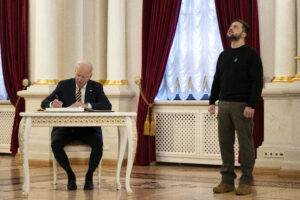
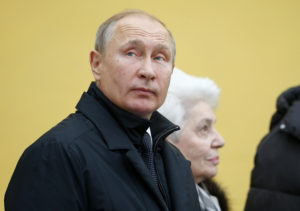

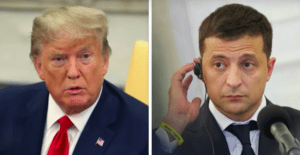

You need to be a supporter to comment.
There are currently no responses to this article.
Be the first to respond.